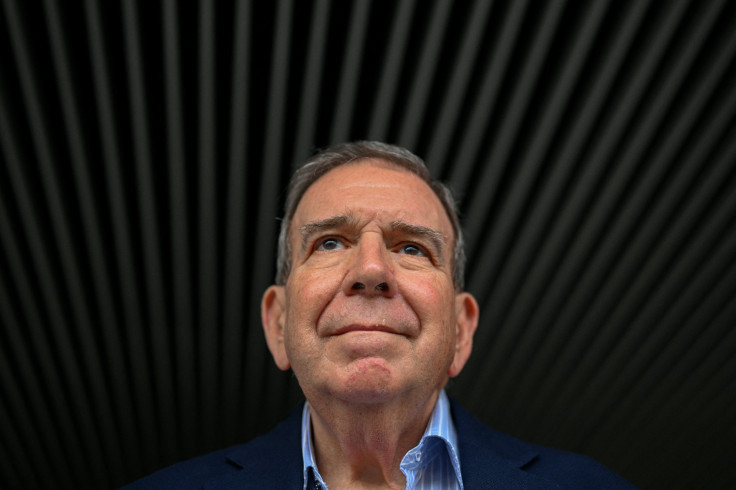
Venezuelan opposition leader and presidential candidate Edmundo González has fled Venezuela, seeking political asylum in Spain, following growing political repression and threats to his safety after the disputed July 28 election. The announcement was made Thursday by Venezuela's Vice President Delcy Rodríguez via social media.
Delcy Rodríguez anunció hace minutos a través de su cuenta en Instagram que @EdmundoGU habría estado asilado en la embajada del reino de España y que va en camino a ese país bajo la figura de asilo político.
— Melanio Escobar (@MelanioBar) September 8, 2024
¿Por qué un opositor tendría que tener salvoconductos del gobierno y… pic.twitter.com/SponEWztdX
González, who had been taking refuge in the Spanish Embassy in Caracas, left the country with the assistance of Spanish authorities. Rodríguez's statement explained that the Venezuelan government granted him safe conduct to leave in the interest of "political peace." Spain's Foreign Minister, José Manuel Albares, confirmed González's departure, adding that he was flying to Spain on a Spanish Air Force plane at his own request.
Edmundo González, a solicitud suya, vuela hacia España en un avión de las Fuerzas Aéreas españolas.
— José Manuel Albares (@jmalbares) September 8, 2024
El Gobierno de España está comprometido con los derechos políticos y la integridad física de todos los venezolanos.
This move comes in the wake of the controversial presidential election in which González represented the opposition after the disqualification of María Corina Machado. Despite claims from the opposition that González won by a large margin, the National Electoral Council declared incumbent President Nicolás Maduro as the victor. The results have faced widespread criticism, with opposition leaders accusing the Maduro government of electoral fraud and lack of transparency.
EU Condemns Political Repression
Josep Borrell, the European Union's High Representative for Foreign Affairs, called González's forced exile "a sad day for democracy in Venezuela," criticizing the ongoing political repression in the country. "No political leader should be forced to seek asylum in another nation," Borrell said, urging Venezuelan authorities to release all political prisoners.
Following the election, Venezuela has experienced a surge in violence, with at least 24 people killed and dozens injured, based on reports received by Human Rights Watch. According to the United Nations, the Venezuelan government has detained more than 2,400 people since the election, creating what international observers describe as a "climate of fear."
The situation in Venezuela has drawn widespread condemnation from human rights organizations such as Amnesty International and Foro Penal, who report ongoing repression, political violence, and arbitrary detentions under the Maduro regime.
González's Supporters Vow to Continue Fight
María Corina Machado has pledged to continue her fight against the Maduro regime, stating that she will not leave the country despite the personal risks. In a recent X post Machado affirmed that Edmundo González will keep fighting for Venezuela from abroad.
A los venezolanos,
— María Corina Machado (@MariaCorinaYA) September 8, 2024
Edmundo González Urrutía, Presidente electo de Venezuela ha salido del país y se encuentra en España.
A partir de nuestra histórica victoria del 28 de julio de 2024, el régimen desató una brutal ola de represión en contra de todos los ciudadanos,…
"On January 10, 2025, President-elect Edmundo González Urrutía will be sworn in as the Constitutional President of Venezuela and Commander-in-Chief of the National Armed Forces," Machado posted on X. "Let this be very clear to everyone: Edmundo will fight from abroad alongside our diaspora, and I will continue fighting here, alongside you."
Opposition leader Juan Pablo Guanipa of the Primero Justicia party reaffirmed support for González's leadership. "No matter where he is, we must keep fighting for the recognition of his victory," Guanipa said on social media, insisting that González was the rightful winner of the election.
Asylum in Spain and the International Response
González's asylum in Spain highlights the growing challenges facing opposition leaders in Venezuela. Spain's Foreign Minister reaffirmed its country's commitment to protecting the political rights and safety of Venezuelans, especially those facing persecution. In a statement, the Spanish government pledged to support González and called for the protection of political activists and human rights defenders in Venezuela.
González, a seasoned diplomat who previously served as Venezuela's ambassador to Argentina and Belgium, accepted his candidacy in April after the disqualification of Machado. In an interview with BBC Mundo in June, González said he took on the role with "humility" and as a personal commitment to Venezuela's democracy.
International pressure continues to mount on Venezuela's National Electoral Council to release the official election results. Countries including the United States and members of the European Union have expressed skepticism over the legitimacy of the election, calling for transparency and fairness.
This is a developing story. Stay updated for more information.
© 2025 Latin Times. All rights reserved. Do not reproduce without permission.





